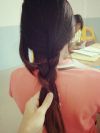|
ESL Forum:
Techniques and methods
in Language Teaching
Games, activities
and teaching ideas
Grammar and
Linguistics
Teaching material
Concerning
worksheets
Concerning
powerpoints
Concerning online
exercises
Make suggestions,
report errors
Ask for help
Message board
|
ESL forum >
Ask for help > which one is correct?
which one is correct?
|

Nutcharat

|
which one is correct?
|
|
Dear the English native speaker. I �m a 3rd year student, from Thailand. I am confuse about those sentences down here 1. He has a long hair. 2. He has long hair. Which one is correct ? I know that �hair � is uncountable noun but some teachers told me that I can put article in front of it. Some teachers told me that if I did like, it would be wrong. Please help me. |
23 Feb 2016
|
|
|
|

kohai

|
|
Only He has long hair is correct when you speak about a boy with long hair. BUT you can say He has a long hair in his spaghetti if you�re really speaking about one hair.
P.S. Well, but I am not a native speaker... 
|
23 Feb 2016
|
|
|
|
|

Matthew@ELSP

|
|
Kohai is right on target with that answer. Specifically, hair is both a countable and mass (not countable) noun. So the countable / not countable noun rule is not the only thing to consider. If you take Kohai �s answer about a hair and imagine that one lonely, long hair on the head of the person, you can see why [hair], not [a hair] is better in this case. |
24 Feb 2016
|
|
|

yanogator

|
|
He wears his hair short, but he has a long hair hanging down over his left eye. He should cut it. Bruce |
24 Feb 2016
|
|
|

MoodyMoody

|
|
To expound further, there are many other nouns that can be either countable or non-count. For example: chicken can be either. "Please buy me some chicken from the store." In this case, the chicken is non-count, and might be breasts, wings, legs, or thighs. "Please buy me some chickens from the store." In this sentence, the chicken is count and means whole chickens, butchered or even still alive. You can even use normally non-count nouns as count when you are referring to varieties of the noun. Example: "Many different rices are served in Thailand, but I think jasmine rice is the most popular." |
24 Feb 2016
|
|
|

alien boy

|
|
This may be a vernacular difference, but I �d typically use "Many different kinds/varieties of rice are served in Thailand, but I think jasmine rice is the most popular." rather than using �rices �. This is pretty much how I �d deal with most uncountables, by using a modifier. Does anyone else have any ideas about this? |
24 Feb 2016
|
|
|